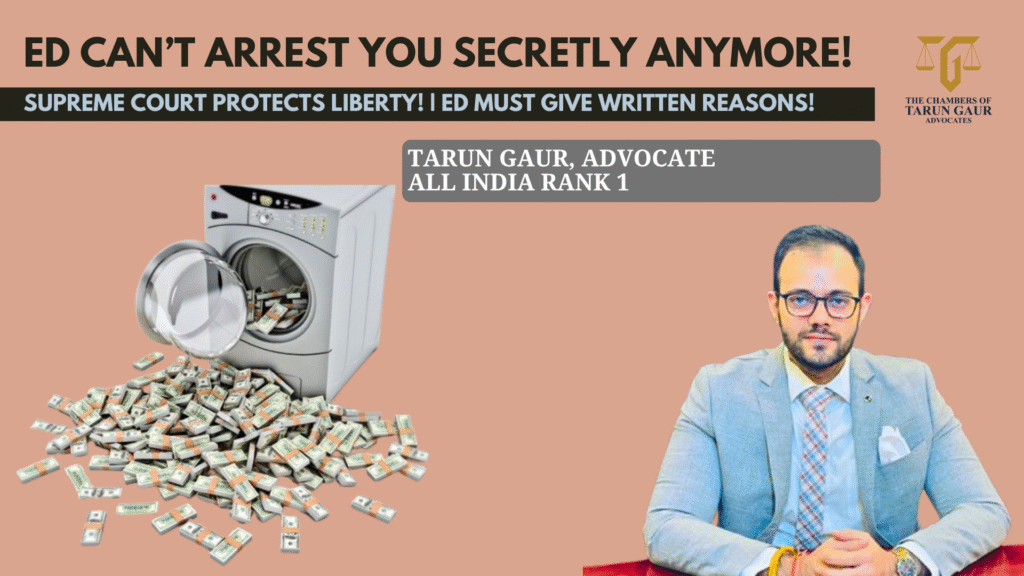By Advocate Tarun Gaur
(Criminal Law & White Collar Crime Expert | Delhi High Court)
Introduction
When it comes to the Prevention of Money Laundering Act (PMLA), let’s face it—the law has steadily evolved into one of the most coercive legal instruments in India. Whether it is bail provisions, attachment of assets, prolonged investigations, or the reversal of burden of proof, the PMLA machinery has left the ordinary citizen gasping for procedural fairness.
At almost every step, both legislative policy and judicial interpretations have made the law harsher, often at the cost of fundamental rights. For years, critics (myself included) have pointed out how PMLA has become a tool of investigative oppression rather than just a financial crime regulator.
But in this dark maze, the Supreme Court’s judgment in Pankaj Bansal v. Directorate of Enforcement has emerged as a rare, favorable step for the accused. It is perhaps the first significant judicial intervention in recent times to restore some balance between enforcement powers and personal liberty.
What Did the Pankaj Bansal Judgment Say?
In Pankaj Bansal v. ED (2023), the **Supreme Court held that Enforcement Directorate officials must furnish the grounds of arrest to the accused in writing under Section 19 of the PMLA.
This means:
-
It is not enough for the ED to merely orally tell you why you’re being arrested.
-
A written disclosure of reasons must be given to the accused at the time of arrest.
-
Failure to do so will make the arrest illegal and liable to be quashed.
The Court explicitly connected this requirement to the constitutional right to personal liberty under Article 21, reaffirming that due process cannot be sacrificed even in economic offences.
Why Is This Judgment So Important?
Let’s be honest:
PMLA has been systematically weaponized over time.
Some critical aspects of this “draconian” design:
-
Stringent Bail (Section 45 PMLA): Near impossible to secure bail due to the twin conditions of “no prima facie case” and “not likely to commit another offence.”
-
Attachment of Property: Before trial, before evidence, even before filing of a chargesheet.
-
Presumption of Guilt: The accused has to prove innocence—completely against traditional criminal jurisprudence.
-
Unfettered ED Powers: With little judicial oversight in the arrest and seizure process.
In such an environment, the Pankaj Bansal judgment acts like the first breath of procedural fairness in years. It acknowledges that “enforcement of economic offences cannot come at the cost of fundamental freedoms.”
Legal Reasoning: A Step Towards Rule of Law
The judgment draws strength from the constitutional mandate of Article 21—the Right to Life and Personal Liberty. The Supreme Court reasoned that:
“An arrested person must know, in writing, the precise reasons for his arrest to enable effective legal recourse.”
This is consistent with the global principle of “Audi Alteram Partem” (hear the other side). How can an accused prepare for defense or seek bail if he doesn’t even know why he’s been arrested?
Additionally, this ruling aligns with:
-
Article 22 of the Constitution (protection against arbitrary arrest),
-
DK Basu Guidelines (arrest procedure safeguards), and
-
International Human Rights norms under Article 9 of the ICCPR.
But Here’s the Catch: The Retrospectivity Mess
Despite this judgment, the courts have created confusion about whether the Pankaj Bansal ruling applies to cases before October 3, 2023.
Some High Courts (like Punjab & Haryana) have said “No retrospective benefit”.
But the Supreme Court itself has raised serious doubts about this stance, especially since Pankaj Bansal’s own arrest was quashed on similar grounds.
This legal contradiction needs urgent clarification.
My Take: One Small Relief in a Sea of Oppression
As someone who routinely deals with white-collar criminal litigation, I can say this with conviction:
The Pankaj Bansal ruling is perhaps the only recent judicial step that favors the accused under PMLA.
Otherwise, both the legislature and judiciary have left no stone unturned to ensure that the law abridges one’s liberty at every possible stage.
From ED summons to bail denials, asset seizures to extended custody, the system is designed to punish you before trial.
This judgment, however limited in scope, is a small yet significant reaffirmation of constitutional principles.
Final Thoughts: Liberty Must Not Be a Casualty
Let us not forget the first principles of justice:
-
The State’s might must not bulldoze individual rights without procedural fairness.
-
Economic crime control cannot justify turning India into a police state.
The Pankaj Bansal judgment rekindles the hope that the judiciary still recognizes this balance.
It may be just one favorable step, but in today’s PMLA regime, even one such step matters.
About the Author
Advocate Tarun Gaur
-
Best Advocate in Dwarka for White Collar Crimes
-
Arbitration Lawyer in Dwarka | Criminal Litigation Expert | Delhi High Court

